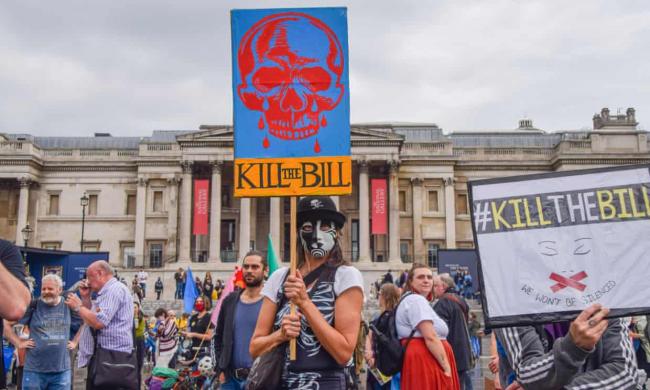Articles Menu

Dec. 8, 2021
Whenever you watch a documentary about a dictator’s path to power, there comes a moment when you think: “Why didn’t people do something? They could have stopped him while there was still time.” We have now reached this moment. As Boris Johnson rams yet more powers into the police, crime, sentencing and courts bill, a vaguely democratic nation is sliding towards autocracy.
It was bad enough when I wrote about this legislation last week. After the bill had mostly passed through parliament and could be properly debated, the government slipped in a series of terrifying amendments. By curtailing the right to protest, it already amounted to the most oppressive legislation tabled by a government of this country since the end of the second world war.
But now, it’s even worse. In a private letter to members of the House of Lords, the government says it intends “to introduce a new offence of interfering with the operation of key infrastructure, such as the strategic road network, railways, sea ports, airports, oil refineries and printing presses, carrying a maximum penalty of 12 months’ imprisonment, an unlimited fine, or both”.
In the previous batch of post-debate amendments, the bill sought, among other measures, to criminalise any protest that might interfere with the construction of new infrastructure. This most recent amendment will apply to existing infrastructure, potentially banning all effective protests, pickets or any other kind of action in places “such as” roads, railways, ports, airports, oil refineries and printing presses. The named infrastructure is bad enough, greatly limiting the scope of protest, but what does “such as” mean? Well, if printing presses are considered key infrastructure – an offering to the Murdoch empire, whose presses were targeted by Extinction Rebellion – this might apply to any corporate or government premises, as well as any public spaces.
These are dictators’ powers. Parliament should be in uproar. The press should be in uproar. Yet you could hear a pin drop. There have been roughly as many stories published over the past fortnight in the UK press that mention Nestlé’s Quality Street chocolates as there have been about this massive attack on democratic rights. It’s not for lack of public interest: even before the amendments were introduced, 600,000 people signed a petition against the bill. But apart from columns by Ian Dunt in the i, Kevin Maguire in the Mirror, Camilla Cavendish in the Financial Times and a couple of minor items on remote pages, the mainstream media are whistling loudly while looking the other way. We don’t have to wait for the next stage of the autocrats’ trajectory – press censorship – to kick in. The press has already fallen into line.
As for the Labour party, if not now, when? Those who excuse its silence say it’s keeping its powder dry. For what? An election held in the future, when effective opposition is even harder than it is today? Unless it fights these measures, by the time it decides to use its fabled powder, the battle may already have been lost.
What about those doughty “freedom warriors”: the people who believe face masks, National Trust brochures and things students say represent an existential threat to our liberties? People such as Steve Baker, Nadine Dorries, Oliver Dowden, Toby Young, Julia Hartley-Brewer and Laurence Fox. So far, none of them, as far as I can tell, have railed against it. You could almost imagine that the only freedoms they value are their own.
Opposition is left to a few peers in the House of Lords, the advocacy group Liberty, alternative news sites and self-organised protesters coming together under the Kill the Bill banner. There’s a demonstration in London this afternoon to coincide with the report stage of the bill in the Lords. The revolt within the establishment you might have expected, brave souls in the Tory party and the billionaire press, is shockingly absent. Those with the power and the platforms seem to have reached a tacit consensus: we’ll sit this one out.
Johnson is the most dangerous prime minister to have presided over the UK in the democratic era. Electors are disarmed by his impression of bonhomie and bumbling, and imagine he’s in it for the bants. But if the history of the past 100 years tells us anything, it’s beware of the clowns. Again and again we have seen the warning signs: the bumbling is an act, a studied imitation of spontaneity and ineptitude. He will go to extraordinary lengths to grasp and maintain power.
When he senses a threat to his position, he moves with brutal efficiency, as the 21 Tory MPs who were suspended for opposing a no-deal Brexit can testify. He has surrounded himself with people who, like dictators’ cronies the world over, appear to be as threatening as they are damaged.
He feels unconstrained by rules, let alone by the mythical “gentleman’s agreement” that takes the place of a formal constitution in this country. He senses weakness like a shark smells blood, and knows that our political safeguards are extremely weak. With an 80-seat majority and much of the media in his pocket, he’s now exploiting the failings of our political system, with voter suppression measures, attacks on the Electoral Commission and judicial review, extensions of the Official Secrets Act and threats to the Human Rights Act.
If we let this pass, and if one day there are documentaries that cover this moment, our descendants will be astonished. Not because the people who could have stopped this were terrified into inaction, as the opponents of other proto-dictatorships were. But because they couldn’t be bothered.
[Top photo: Kill The Bill protest, London, 21 August 2021. ‘A vaguely democratic nation is sliding towards autocracy.’ Photograph: Vuk Valcic/SOPA Images/REX/Shutterstock]